-
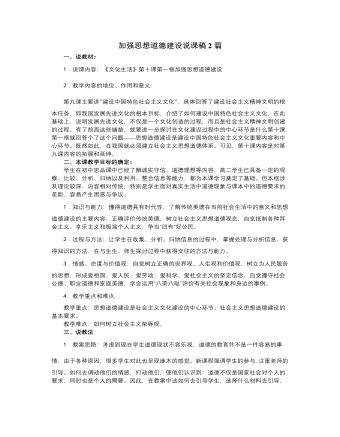
人教版高中政治必修3加强思想道德建设说课稿2篇
师:建立社会主义思想道德体系,必须牢固树立社会主义荣辱观。在我们的社会主义社会里,是非、善恶、美丑的界限绝对不能混淆,坚持什么、反对什么,倡导什么、抵制什么,都必须旗帜鲜明。我们坚持以热爱祖国为荣、以危害祖国为耻,以服务人民为荣、以背离人民为耻,以崇尚科学为荣、以愚昧无知为耻,以辛勤劳动为荣、以好逸恶劳为耻,以团结互助为荣、以损人利己为耻,以诚实守信为荣、以见利忘义为耻,以遵纪守法为荣、以违法乱纪为耻,以艰苦奋斗为荣、以骄奢淫逸为耻。课堂小结通过本节课学习,使我们认识到中国特色社会主义文化建设的中心环节是思想道德建设,了解什么是社会主义思想道德,为什么要建设社会主义思想道德体系和怎样建设社会主义思想道德体系,大力倡导“爱国守法、明礼诚信、团结友善、勤俭自强、敬业奉献”的基本道德规范。我们要大力加强社会主义思想道德建设,为社会主义各项事业的发展提供强大的精神动力和方向保证。
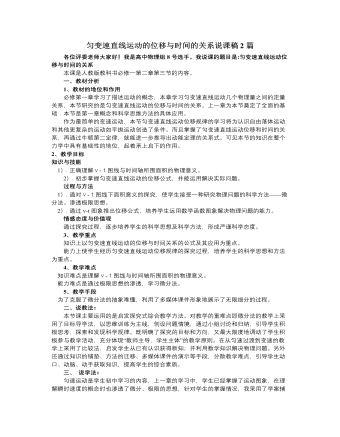
人教版新课标高中物理必修1匀变速直线运动的位移与时间的关系说课稿2篇
培养学生合作交流意识和探究问题的能力,这一部分知识层层递进,符合学生由特殊到一般、由简单到复杂的认知规律。4、互动探究(1)极限思想的渗透让学生阅读“思考与讨论”小版块.培养学生的自学和阅读能力提出下列问题,进行分组讨论:a、用课本上的方法估算位移,其结果比实际位移大还是小?为什么?b、为了提高估算的精确度,时间间隔小些好还是大些好?为什么?针对学生回答的多种可能性加以评价和进一步指导。让学生从讨论的结果中归纳得出:△t越小,对位移的估算就越精确。渗透极限的思想。通过小组内分工合作,讨论交流,培养学生交流合作的精神,以及搜集信息、处理信息的能力;通过小组间对比总结,使学生学会在对比中发现问题,在解决问题过程中提高个人能力;
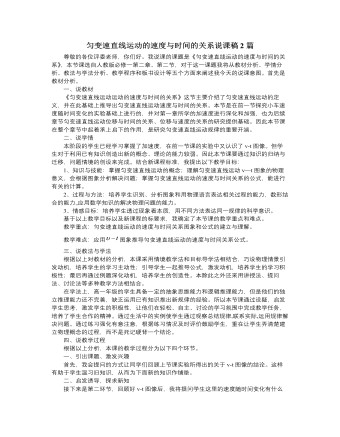
人教版新课标高中物理必修1匀变速直线运动的速度与时间的关系说课稿2篇
设计意图:几道例题及练习题,其中例1小车由静止启动开始行驶,以加速度 做匀加速运动,求2s后的速度大小?进而变式到:小车遇到红灯刹车……,充分体现了“从生活到物理,从物理到社会”的物理教学理念;例题及练习题由浅入深、由易到难、各有侧重,体现新课标提出的让不同的学生在物理上得到不同发展的教学理念。这一环节总的设计意图是反馈教学,内化知识。(6) 小结归纳,拓展深化我的理解是,小结归纳不应该仅仅是知识的简单罗列,而应该是优化认知结构,完善知识体系的一种有效手段,为充分发挥学生的主题作用,从学习的知识、方法、体验是那个方面进行归纳,我设计了这么三个问题:① 通过本节课的学习,你学会了哪些知识;② 通过本节课的学习,你最大的体验是什么;③ 通过本节课的学习,你掌握了哪些学习物理的方法?
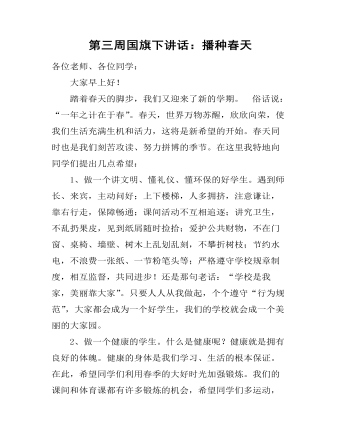
第三周国旗下讲话:播种春天
各位老师、各位同学:大家早上好!踏着春天的脚步,我们又迎来了新的学期。 俗话说:“一年之计在于春”。春天,世界万物苏醒,欣欣向荣,使我们生活充满生机和活力,这将是新希望的开始。春天同时也是我们刻苦攻读、努力拼博的季节。在这里我特地向同学们提出几点希望:1、做一个讲文明、懂礼仪、懂环保的好学生。遇到师长、来宾,主动问好;上下楼梯,人多拥挤,注意谦让,靠右行走,保障畅通;课间活动不互相追逐;讲究卫生,不乱扔果皮,见到纸屑随时捡拾;爱护公共财物,不在门窗、桌椅、墙壁、树木上乱划乱刻,不攀折树枝;节约水电,不浪费一张纸、一节粉笔头等;严格遵守学校规章制度,相互监督,共同进步!还是那句老话:“学校是我家,美丽靠大家”。只要人人从我做起,个个遵守“行为规范”,大家都会成为一个好学生,我们的学校就会成一个美丽的大家园。
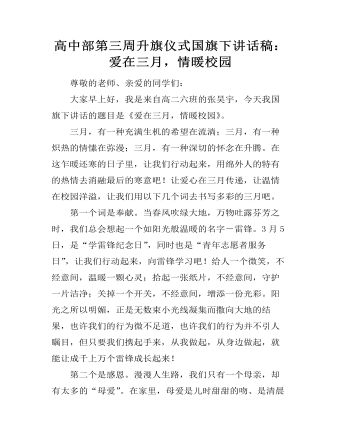
高中部第三周升旗仪式国旗下讲话稿:爱在三月,情暖校园
尊敬的老师、亲爱的同学们:大家早上好,我是来自高二六班的张昊宇,今天我国旗下讲话的题目是《爱在三月,情暖校园》。三月,有一种充满生机的希望在流淌;三月,有一种炽热的情愫在弥漫;三月,有一种深切的怀念在升腾。在这乍暖还寒的日子里,让我们行动起来,用绵外人的特有的热情去消融最后的寒意吧!让爱心在三月传递,让温情在校园洋溢,让我们用以下几个词去书写多彩的三月吧。第一个词是奉献。当春风吹绿大地,万物吐露芬芳之时,我们总会想起一个如阳光般温暖的名字―雷锋。3月5日,是“学雷锋纪念日”,同时也是“青年志愿者服务日”,让我们行动起来,向雷锋学习吧!给人一个微笑,不经意间,温暖一颗心灵;拾起一张纸片,不经意间,守护一片洁净;关掉一个开关,不经意间,增添一份光彩。阳光之所以明媚,正是无数束小光线凝集而撒向大地的结果,也许我们的行为微不足道,也许我们的行为并不引人瞩目,但只要我们携起手来,从我做起,从身边做起,就能让成千上万个雷锋成长起来!第二个是感恩。漫漫人生路,我们只有一个母亲,却有太多的“母爱”。在家里,母爱是儿时甜甜的吻、是清晨路上的几句叮咛、是眼角两旁的一条皱纹、是秋风吹散的一缕白发……在学校,母爱是润物无声教会我们打开知识大门的钥匙,是不辞劳苦帮助我们扬起理想风帆的桅杆,是无微不至拨开我们心灵阴霾的春风……
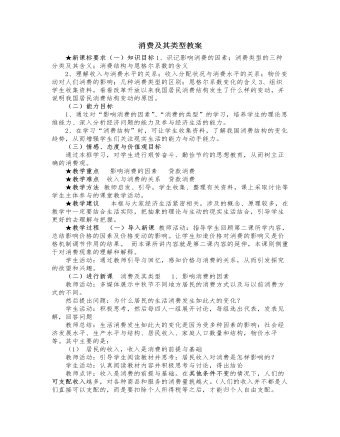
人教版高中政治必修1消费及其类型教案
贷款消费不仅满足了消费者的生活需要,提高了消费者的生活质量,而且促进了经济的发展,特别是我国经济发展进入买方市场后,贷款消费对扩大内需,拉动经济的增长起来重要的作用。所以,我们要转变传统的消费观念,以积极的态度来对待贷款消费,通过贷款消费满足来满足当前的需要,通过生活质量。当然,在贷款消费是也要考虑自己的偿还能力,还要讲究信用,按时还贷。(3)按消费的目的不同,可分为生存资料消费、发展资料消费和享受资料消费。其中生存资料消费是最基本的消费。随着经济水平的提高,发展资料和享受资料消费将逐渐增加。3、消费结构 教师活动:引导学生看书,指出(1)消费结构的含义:就是指人们各类消费支出在消费总支出中所占的比重。教师活动:引导学生分析个人及家庭消费状况的变化,说明对消费结构的理解,并总结消费结构的变化特点。学生活动:积极讨论,踊跃发言
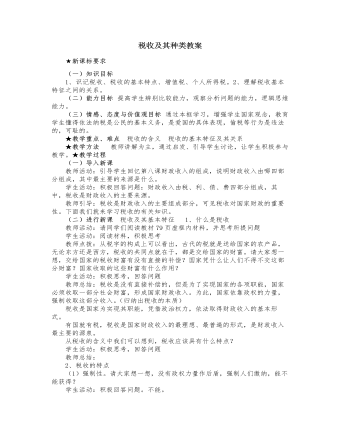
人教版高中政治必修1税收及其种类教案
教师总结:近二十多年来,我国个人所得税的征收发展迅速,这也反映了我国经济水平、人民生活收入有了较大提高。与增值税的计税方法不同,个人所得税采用累进税率的计税办法,就是个人所得越高,税率越高,纳税人个人收入越多,缴纳个人所得税越多。这一特点从教材83页个人所得税税率表上可以看出。教师点拨:个人所得税的计算办法是分段计算的,个人收入800元以内不计税,多余800元以上部分,按不同税率分段计税。请同学们计算教材所列题目。学生活动:计算。应税所得额:4000元;不超过500元部分:25元;500――2000元部分:150元;2000――4000元部分:300元;累计所得税:475元教师活动:同学们想一想,这样计算个人所得税有什么意义呢?学生活动:认真思考,回答问题教师点拨:有利于增加财政收入,有利于调节个人收入分配,实现社会公平。(三)课堂总结、点评
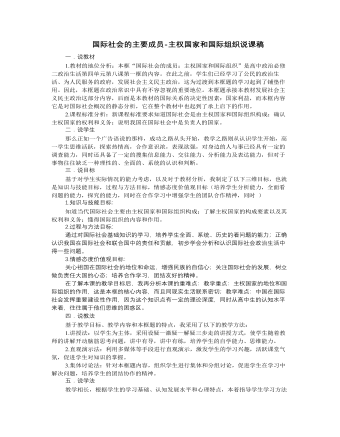
人教版高中政治必修2国际社会的主要成员-主权国家和国际组织说课稿
【教师总结:联合国的会徽的世界地图象征着联合国是一个世界性的国际组织;图案中得橄榄枝象征着和平。联合国采取了很多措施以实现它的宗旨,如对于朝鲜违反国际法规进行核试验,联合国给予警告和制裁,充分体现了它维护国际和平与安全,促进国际合作与发展的宗旨。】对于中国与联合国的关系这部分内容,我将请阅读教材92页几幅图片及材料内容,设置活动探究课中国在联合国的声音和身影,请合作讨论思考以下两个问题,中国与联合国的关系;列举事实说明中国在国际社会中的重要作用。 教师通过剖析中国在联合国的地位和作用,引导学生理解中国在国际社会中发挥着重要作用,是负责任的国家;同时培养学生综合运用知识分析说明问题的能力,使学生感受作为中国人的自豪。【教师总结:中国是联合国的创始国之一,中国作为联合国的创始国和安理会常任理事国之一,一贯遵循联合国宪章的宗旨和原则,积极参与联合国及其专门机构有利于世界和平和发展的活动。】
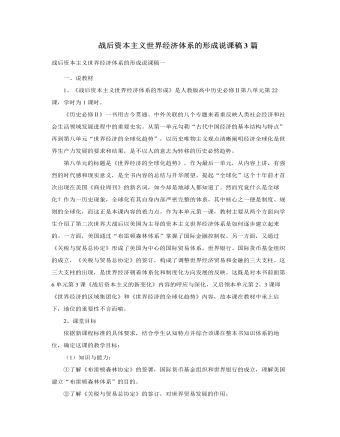
人教版高中历史必修2战后资本主义世界经济体系的形成说课稿3篇
1、《战后资本主义世界经济体系的形成》是人教版高中历史必修Ⅱ第八单元第22课,学时为1课时。《历史必修Ⅱ》一书用古今贯通、中外关联的八个专题来着重反映人类社会经济和社会生活领域发展进程中的重要史实。从第一单元勾勒“古代中国经济的基本结构与特点”再到第八单元“世界经济的全球化趋势”,以历史唯物主义观点清晰阐明经济全球化是世界生产力发展的要求和结果,是不以人的意志为转移的历史必然趋势。第八单元的标题是《世界经济的全球化趋势》,作为最后一单元,从内容上讲,有强烈的时代感和现实意义,是全书内容的总结与升华展望。提起“全球化”这个十年前才首次出现在美国《商业周刊》的新名词,如今却是地球人都知道了。然而究竟什么是全球化?作为一历史现象,全球化有其自身内部严密完整的体系,其中核心之一便是制度、规则的全球化,而这正是本课内容的着力点。
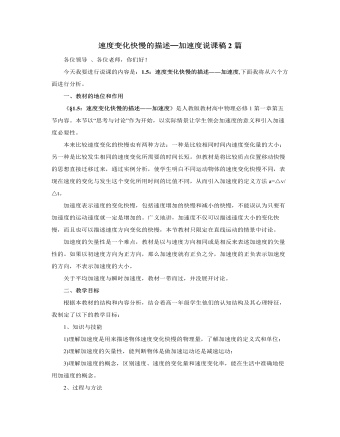
人教版新课标高中物理必修1速度变化快慢的描述─加速度说课稿2篇
本来比较速度变化的快慢也有两种方法:一种是比较相同时间内速度变化量的大小;另一种是比较发生相同的速度变化所需要的时间长短。但教材是将比较质点位置移动快慢的思想直接迁移过来,通过实例分析,使学生明白不同运动物体的速度变化快慢不同,表现在速度的变化与发生这个变化所用时间的比值不同,从而引入加速度的定义方法a=△v/△t。加速度表示速度的变化快慢,包括速度增加的快慢和减小的快慢,不能误认为只要有加速度的运动速度就一定是增加的。广义地讲,加速度不仅可以描述速度大小的变化快慢,而且也可以描述速度方向变化的快慢,本节教材只限定在直线运动的情景中讨论。加速度的矢量性是一个难点,教材是以与速度方向相同或是相反来表述加速度的矢量性的。如果以初速度方向为正方向,那么加速度就有正负之分,加速度的正负表示加速度的方向,不表示加速度的大小。
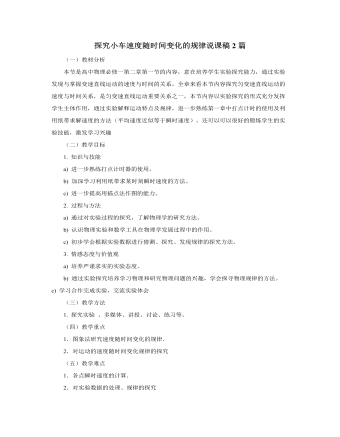
人教版新课标高中物理必修1探究小车速度随时间变化的规律说课稿2篇
(三)合作交流能力提升教师:刚才我们通过实验了解了小车的速度是怎样随时间变化的,但实验中有一定的误差,请同学们讨论并说出可能存在哪些误差,造成误差的原因是什么?(每个实验小组的同学之间进行热烈的讨论)学生:测量出现误差。因为点间距离太小,测量长度时容易产生误差。教师:如何减小这个误差呢?学生:如果测量较长的距离,误差应该小一些。教师:应该采取什么办法?学生:应该取几个点之间的距离作为一个测量长度。教师:好,这就是常用的取“计数点”的方法。我们应该在纸带上每隔几个计时点取作一个计数点,进行编号。分别标为:0、1、2、3……,测各计数点到“0”的距离。以减小测量误差。教师:还有补充吗?学生1:我在坐标系中描点画的图象只集中在坐标原定附近,两条图象没有明显的分开。学生2:描出的几个点不严格的分布在一条直线上,还能画直线吗?
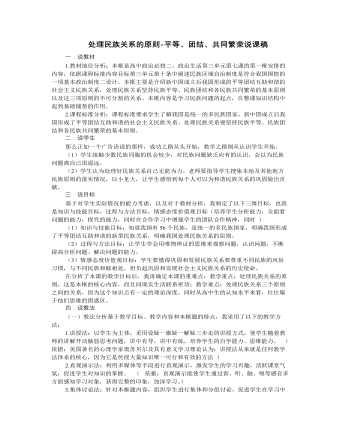
人教版高中政治必修2处理民族关系的原则-平等、团结、共同繁荣说课稿
环节四 情感升华,感悟生活播放《爱我中华》,感受祖国的伟大,民族的团结。设计意图:使学生感受伟大的中华民族的精神,内心产生共鸣,抒发强烈的爱国热情。教师带领学生一起合唱,用歌声结束本堂课内容,能再次唤起学生的爱国情感,使学生认识到:维护国家统一和民族团结是每个公民的义务。环节五 课堂小结 巩固知识本节课我采用线索性的板书,整个知识结构一目了然,为了充分发挥学生在课堂的主体地位,我将课堂小结交由学生完成,请学生根据课堂学习的内容,结合我的板书设计来进行小结,以此来帮助教师在第一时间掌握学生学习信息的反馈,同时培养学生归纳分析能力、概括能力。本节课,我根据建构主义理论,强调学生是学习的中心,学生是知识意义的主动建构者,是信息加工的主体,要强调学生在课堂中的参与性、以及探究性,不仅让他们懂得知识,更让他们相信知识,并且将知识融入到实践当中去,最终达到知、情、意、行的统一。

新人教版高中英语必修2Unit 2 Wildlife Protection-Discovering Useful Structure教案二
2.表示现阶段正在进行的被动动作(该动作在说话的瞬间未必正在进行)。Many interesting experiments are being carried out these days.(说话时,并不一定正在进行)3.表示一种经常性的被动行为,常和always,constantly 等表示频度的副词连用,这种用法常常带有赞扬或厌恶的感情色彩。He is always being praised by the leader.4.表示按计划或安排主语将要承受谓语动词所表示的动作(仅限于少数及物动词)。A party is being held tonight.Step 4 Special cases1.像take care of, look after, talk about, think of等动词与介词构成的短语用于现在进行时的被动语态时, 其中的介词不可省略。The ways to stop illegally hunting are being talked about. 2.可与部分情态动词连用,表示对正在发生的事情的推测。She may be being punished by her mother.3.有时可表示按计划或安排将要进行的一个被动动作。A celebration is being held this weekend for his success.4.某些表示“状态、心理活动、存在”等的动词,如have,want,need,love,一般不用现在进行时的被动语态,而常用一般现在时的被动语态。With the population increasing,more land is needed.5.“be+under/in+n.”可表示现在进行时的被动意义。My computer is under repair.=My computer is being repaired.

新人教版高中英语必修2Unit 2 Wildlife Protection-Reading for Writing教案二
This lesson aims at making a poster about protecting wildlife after reading some posters. During reading students are guided to understand the content and try to summarize the posters with one sentence. Then students are guided to try to make a poster about protecting wildlife.1. Read the two posters and try to understand the summary sentences.2. Look at the two posters and try to understand what emotions they express.3. Try to summarize the features of posters4. Try to make a poster about wildlife.1. Look at the two posters and try to understand what emotions they express.2. Try to summarize the features of posters3. Try to make a poster about wildlife.Step 1 Lead inLook at the the posters on the textbook and ask:Which emotions do the posters communicate ?Step 2 Read the poster and answer the questions.1. What do you think of the animals in the poster on the left ?I think it is frightening and ugly.2. Why do we should protect the ugly animals ?All species--the good, the bad, and the ugly-- should be treated equally.The world needs all kinds--without variety, our planet cannot survive.3. Why are billions of trees being cut down every year ?To make paper for humans.4. What result will be lead to after the trees are cut down ?A lost of animal homes are being destroyed./The habitat of wildlife is being destroyed.Step 3 Find the feature of posters1. What does each poster use to stir up emotions ?On the left, it makes us a little frightened and it looks a little ugly, but it can activate our curiosity--What is it? And What is wrong with it?On the right, it makes us feel a little sad and want to protect them.

新人教版高中英语必修2Unit 2 Wildlife Protection-Reading and Thinking教案二
The theme of this unit is human and nature, focusing on the theme of wildlife protection. Nature is a complex ecosystem, in which there are delicate balance between animals and plants. Because of the role of the food chain, the extinction of one species will produce influence, causing a series of chain reaction. Large scale extinction of species will have a serious and even irreversible impact on the ecosystem, resulting in immeasurable losses. Therefore, it is of great significance to protect wild species. To protect wild species is to protect human beings themselves. The motto of this unit is "when the buying stops, the killing can too,” which is a public service advertising slogan to protect wildlife. It tells people that every rhinoceros horn, every fur, every bowl of shark fin soup, every Ivory product, and every tiger bone product, etc. consumed by human beings, are innocent wild animals slaughtered behind them. The mission of wild aid is to ban illegal trade in endangered wildlife and mitigate climate change. It aims to educate the public to reduce the consumption demand for endangered wildlife products through public publicity and improve the awareness of environmental protection.1. Improve the awareness of wildlife protection by acquiring the knowledge of wildlife protection.2. Focus on environmental protection and protection of all lives.3. Analysis of the living environment of wild animals with appropriate thinking mode.4. Skillfully use the vocabulary and grammar knowledge of this unit to cultivate self-study ability according to the unit content5. Develop cooperative learning ability through discussion and other ways1. Enable the Ss to talk about the current situation of wild animals.2. Guide the Ss to summarize the main idea of each paragraph as well as the main idea of the text.

人教版高中语文必修3《马嵬(其二)》教案2篇
结合历史自古以来,江山美人历来都是引无数英雄豪杰竞折腰的,如果说英雄选择了美人却丢了江山,把所有罪名都归结于“女人是祸水”。但是,纣王无道,和有了妲己有必然的联系吗?有人说妲己坏透了,坏透了的妲己如果不是取得纣王的信任是坏不起来的,纣王听信了妲己的谗言,听与不听决定权在纣王,而不在妲己。强势永远在纣王一边。再来看看西施和杨贵妃:西施是作为越国贡献给吴国的供品来到吴王夫差的身边的,杨贵妃更是先是李隆基的儿媳妇被看中而得宠的。所以,西施和杨贵妃这两个可怜的女人根本没有自己的独立选择,没有独立的爱情,如果没有西施,就会有南施,或北施;如果没有杨贵妃,就会有李贵妃,王贵妃,总之什么施,什么妃是不能少的,因为那是吴王和李隆基的需要。

新人教版高中英语必修2Unit 1 Cultural Heritage-Discovering Useful Structure教案二
This theme of the part is “ Describe people or things in greater detail”. Students have learned the grammar(restrictive relative clauses) in Book 1, and further review and consolidate its structure “prep+relative pronouns(which/whom)” and the relative adverbs(when, where and why), besides students should understand its form, meaning and functions. In this section, students should be able to express the grammar correctly in daily communication and in the writing. 1. Review the basic usages of relative pronouns and adverbs of attributive clauses . 2. Learn to use some special cases about restrictive relative clauses.3. Learn to write sentences with restrictive relative clauses flexibly according to the context.1. Review the basic usages of relative pronouns and adverbs of attributive clauses .2. Learn to use some special cases about restrictive relative clauses.3. Learn tow rite sentences with restrictive relative clauses flexibly according to the context.Step 1. Observe the following sentences, and mark the relative pronouns and the adverbs. 1. After listening to the scientists who had studied the problems, and citizens who lived near the dam, the government turned to the United Nations for help.2. Temples and other cultural sites were taken down piece by piece, and then moved and put back together again in a place where they were safe from the water.Step 2 PracticePlease complete these sentences with relative pronouns and relative adverbs and answer the following questions.Questions: 1. What is the head noun ?2. What relative words should be used ?3. What elements do they act in these sentences ?

新人教版高中英语必修2Unit 3 The Internet-Discovering Useful Structure教案二
This teaching period mainly deals with grammar “The Present Perfect Passive Voice.” To begin with, teachers should lead students to revise what they have learned about the Present Perfect Passive Voice. And then, teachers move on to stress more special cases concerning this grammar。This period carries considerable significance to the cultivation of students’ writing competence and lays a solid foundation for the basic appreciation of language beauty. The teacher is expected to enable students to master this period thoroughly and consolidate the knowledge by doing some exercises. 1. Guide students to review the basic usages of the Present Perfect Passive Voice2. Lead students to learn to use some special cases concerning the Present Perfect Passive Voice flexibly.2. Enable students to use the basic phrases structures flexibly.3. Strengthen students’ great interest in grammar learning.1. Help students to appreciate the function of the Present Perfect Passive Voice in a sentence2. Instruct students to write essays using the proper the Present Perfect Passive Voice.观察下列句子特点,总结共同点。1.(教材P28)Much has been written about the wonders of the World Wide Web.2.(教材P28)But the Internet has done much more for people than simply make life more convenient.3.(教材P28)Many people have been helped by the club.4.(教材P28)She no longer feels lonely, and her company has become quite successful.5.(教材P32)Today I thought I’d blog about a question that has been asked many times—how do you stay safe online and avoid bad experiences on the Internet?

新人教版高中英语必修2Unit 3 The Internet-Listening &Speaking&Talking教案二
From the pictures in the text and the title--- choose the best app, we can know that this part is about how to save money by using apps.Step 2 While-listening1. Laura and Xiao Bo are talking about apps. Listen to their conversation and find out what apps they want.Xiao Bo is looking for a(n) exercise app to help him get in shape.Laura would like an app for getting rich and another that will make her grades better.2. Listen again. Are the sentences true T or false F?1). Both of Xiao Bo's apps keep track of the steps he takes._____2). Xiao Bo's second app can help him make a fitness plan._____3). Laura needs an app that will help her get discounts.______4). Laura needs an app that will add money to her bank account._______F T F T3. Listen once more and tick the sentence you hear. Underline the words used to express predictions, guesses, and beliefs.Predictions, Guesses, and Beliefs________It might help me walk more.________My guess is that it wouldn't work.________I imagine this app would help me get fit faster________I suppose that would be good.________I guess you could save a little with this app.________I suppose there would be some problems, too.________I believe this app could help me get thinner.

新人教版高中英语必修2Unit 3 The Internet-Reading and Thinking教案二
Q5:What's Jan's next goal?Her next goal is to start a charity website to raise money for children in poor countries.Q6:What can we learn from her experiences?We learn that when we go through tough times, we can find help and support from other people online. We learn that we can feel less lonelyStep 5: While reading---rethinkingQ1: What is Jan’s attitude to the Internet ?Thankful/Grateful, because it has changed her and her life.Q2: What writing skills is used in the article ?Examples(Jan’s example, the 59-year-old man’s and the 61-year-old woman’s example)Q3: Can you get the main idea of the article ?The Internet has changed Jan’s life/Jan’s life has been changed by the Internet.Step 6 Post reading---Retell the storyMuch has been written about the wonders of the World Wide Web. There are countless articles (1)telling(tell) us how the Internet has made our lives more convenient. But the Internet has done a lot (2)more(much) for people than simply make life more convenient. People’s lives (3) have been changed(change) by online communities and social networks so far. Take Jan for example, who developed a serious illness that made her (4)stuck(stick) at home with only her computer to keep (5)her(she) company. She joined an online group (6)where she could share problems, support and advice with others. She considered the ability to remove the distance between people as one of the greatest (7)benefits(benefit). She was so inspired (8)that she started an IT club in which many people have been helped. She has started to learn more about how to use the Internet to make society better. Her next goal is to start a charity website to raise money (9)for children in poor countries. Jan’s life has been (10)greatly(great) improved by the Internet.